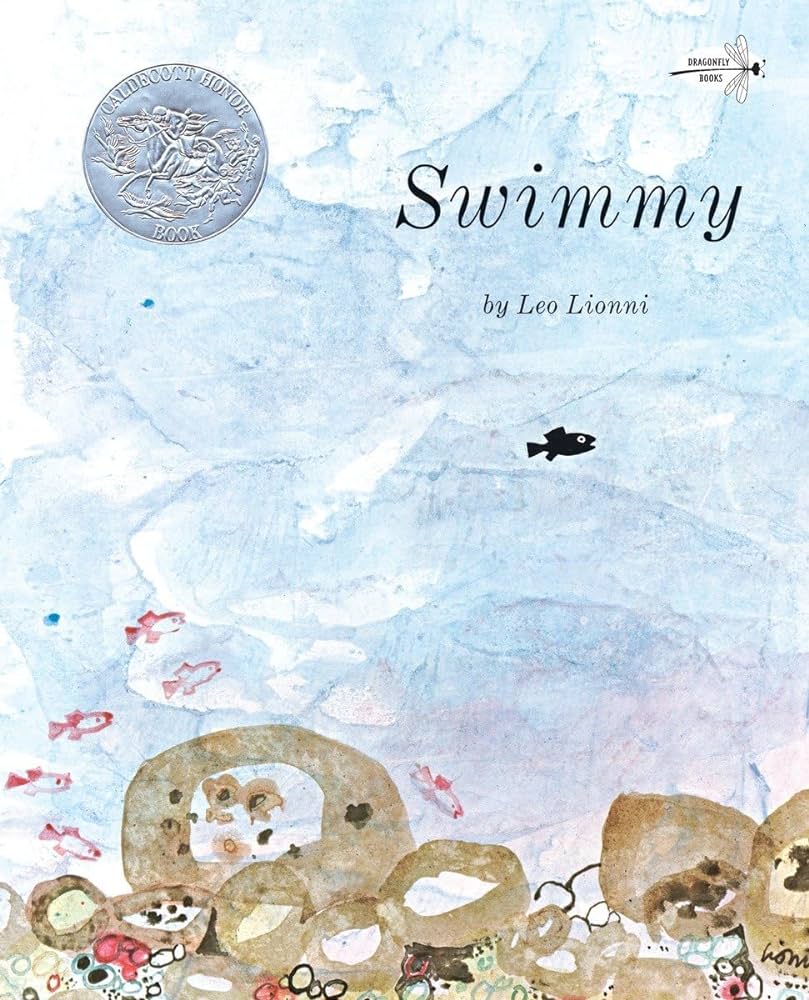SEL Read Aloud: Swimmy by Leo Lionni

Summary
Comprehension Questions
Six questions aligned to Bloom’s taxonomy for teacher’s to evaluate students’ comprehension
- Remembering: What color was Swimmy compared to the other fish in his school?
- Understanding: How did Swimmy feel after he lost his family?
- Applying: If you were Swimmy, what other ways could you think of to stay safe from big fish?
- Analyzing: What are the main differences between Swimmy and the other little red fish?
- Evaluating: How effective was Swimmy in teaching the little fish to overcome their fear? Provide reasons for your answer.
- Creating: Create a short story about Swimmy meeting another fish who is different from the others. How do they help each other?
CASEL Discussion Questions
Five questions aligned to the CASEL competencies for teachers to foster an engaging discussion and foster social-emotional learning
- Self-Awareness: How did Swimmy’s feelings change as he explored the ocean and saw different creatures?
- Self-Management: What strategies did Swimmy use to stay calm and focused while teaching the little fish to swim together?
- Social Awareness: How did Swimmy understand and respond to the fears of the little red fish he found hiding?
- Relationship Skills: What did Swimmy do to build trust with the new school of little fish?
- Responsible Decision Making: What other choices could Swimmy have made, and what might have been the outcomes of those choices?
Design Thinking Challenge
Take students’ learning even further by incorporating the Imagineerz design thinking framework
Design a Safe Haven for Swimmy and His Friends
Understand
- Begin by reading “Swimmy” by Leo Lionni. Discuss the main issues Swimmy faces, including his feelings of loneliness and his journey to find a new school of fish. Focus on how Swimmy’s experiences and the support from his new friends lead to finding a sense of belonging and purpose.
- Initiate a class discussion on the themes of the book, such as teamwork, resilience, and creativity. Explore questions like: What made Swimmy feel sad and lonely at the beginning of the story? How did Swimmy’s exploration of the ocean change his perspective? How did Swimmy help the little fish overcome their fear of big fish?
Ideate
- Encourage students to brainstorm ideas for a safe haven where Swimmy and his friends can live and play safely. Prompt them to think about various areas and features that could symbolize different parts of Swimmy’s adventure, such as a play area for different sea creatures he met, a safe hiding spot from predators, and an educational zone to learn about ocean life.
- Ask students to consider additional features that might help keep the fish safe and happy, such as protective barriers, food sources, and interactive elements that teach visitors about the sea creatures.
Prototype
- In small groups or individually, students will create a prototype of their “Safe Haven for Swimmy” using classroom materials such as cardboard, clay, markers, and any other craft supplies. They should design their haven to include various areas that reflect Swimmy’s journey, ensuring that each section is both safe and fun.
- Encourage creativity in constructing the haven, including elements that could symbolically represent Swimmy’s journey of teamwork and exploration, such as informational signs about the sea creatures, signs with motivational quotes from the story, or badges for visitors who complete certain activities.
Test
- Students will present their prototypes to the class, explaining their design process, how their safe haven works, and its intended benefits for Swimmy and his friends. Demonstrate the haven’s functionality by showing how Swimmy and his friends would navigate through the different areas and what they would learn at each stop.
- Gather feedback from classmates and teachers: Does the safe haven include engaging and educational areas? Is it easy to navigate and safe for Swimmy and his friends? What improvements could enhance its functionality or make it more effective for teaching visitors about teamwork and the ocean?
Read Aloud
If you appreciated getting to read this book with your class, you might also want to share this book with them!
Additional Resources
Copyright Notice
The image on this page comes from the book Swimmy by Leo Lionni. Copyright © 2017 by Leo Lionni.


